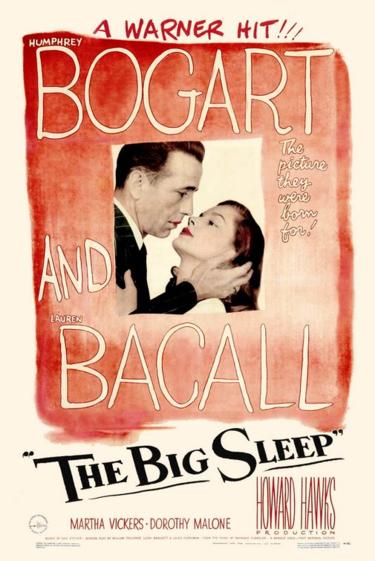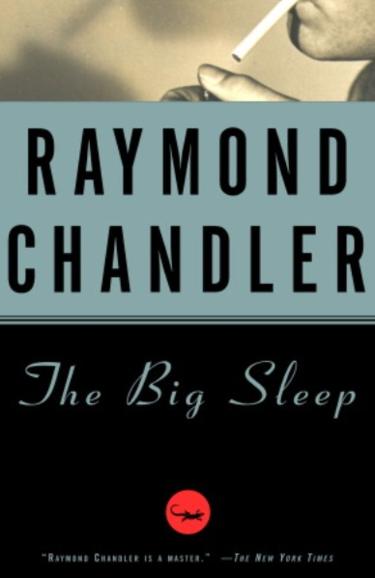Was the Plot of the Big Sleep So Confusing That Not Even the Screenwriters Understood It?
Here is the latest in a series of examinations into urban legends about movies and whether they are true or false. Click here to view an archive of the movie urban legends featured so far.
MOVIE URBAN LEGEND: The plot of the film adaptation of The Big Sleep was so convoluted that not even the screenwriters fully understood the plot.
Howard Hawks’ 1946 film version of Raymond Chandler’s The Big Sleep is an excellent film…

The original novel is quite good, as well..

Right from the start, it’s worth noting that the film IS very convoluted (I suppose a kinder word is that it is “complex”).
However, the degree to which the film is convoluted has been overstated over the years to the point where it is just, well, false.
To wit, Allmovie.com‘s review of the film states:
Any further attempts to outline the plot would be futile: the storyline becomes so complicated and convoluted that even screenwriters William Faulkner, Leigh Brackett, and Jules Furthmann were forced to consult Raymond Chandler for advice (he was as confused by the plot as the screenwriters).
(As a quick aside, yeah, it’s pretty cool that William Faulkner co-wrote such a great film).
That is just not true.
It’s really a pretty straightforward case of a simple tale getting exaggerated over the years until it sounds a lot bigger than it really was.
Chandler WAS consulted during the filming of the movie, but not by the screenwriters, but rather by the director Hawks and the star, Humphrey Bogart (playing Chandler’s famous private eye, Philip Marlowe).
Bogart and Hawks sent Chandler a telegram telling him that they had been arguing over whether a particular character had been murdered or committed suicide, so they figured they’d ask Chandler, who told a friend in a letter that he told them “dammit I didn’t know either.”
From the tone of Chandler’s letter (which was collected in Tom Hiney and Frank MacShane’s The Raymond Chandler Papers: Selected Letters and Nonfiction 1909-1959), it does not appear as though Chandler was giving a serious answer, but rather a sort of “Why are you bothering me with such a question?” In the very same letter, he tells his friend that apparently a studio executive found out how much the telegram had cost to send and drilled Hawks over wasting studio funds on such a frivolous pursuit.
But even if he was being serious, he was not corresponding with the screenwriters, and there is no record of any other such correspondence. And since the story about Hawks and Bogart telegraming him is pretty much exactly the story that has been told about the screenwriters asking him, and it seems pretty darn likely that the one is being confused/conflated with the other. In other words, the only evidence that the screenwriters had any problem understanding the plot of the film is the “they consulted Chandler” anecdote, which is not true. So absent any evidence that the screenwriters contacted Chandler or any other similar evidence of them expressing confusion over the plot of the film then I do not think it is fair to rule anything but that the legend is…
STATUS: False
Feel free (heck, I implore you!) to write in with your suggestions for future installments! My e-mail address is bcronin@legendsrevealed.com.






It’s also worth noting that in the prerelease cut of the film shown to preview audiences, there’s a long scene where Marlowe sits down with the chief of police and they explain the plot in detail. When the film was released, this scene was deleted to make room for more banter between Marlowe and Vivian Rutledge. Part of the reason for the film’s reputation is that the filmmakers (correctly) decided that audiences would be more interested in the chemistry between Bogart and Bacall than the mechanics of the plot.
Note that the novel The Big Sleep was actually cobbled together from two short stories (Chandler commonly did this), so isn’t a coherent whole and has some loose ends, notably who killed the chauffeur. This is the question that Hawks asked Chandler:
http://en.wikipedia.org/wiki/The_Big_Sleep#Background
I always heard it as “the killer couldn’t possibly have done it” which would seem to indicate the writers didn’t understand how it all tied together (they switch the killer from the original novel). Though the success shows nobody (myself included) is that haunted by logical flaws in the plot.
[…] cult classic The Big Lebowski (1998) would be a colossal failure. Modeled after the infamously convoluted plot of 1946’s The Big Sleep, The Big Lebowski introduces new characters and story twists in […]
The explanation which I have read, which makes the most sense, is that what Chandler meant was basically “You have changed so much of the book that I have no idea who killed the chauffeur in your script,” not that he himself didn’t know who killed the chauffeur in the book. I think people like to think that Chandler put less effort into his writing because he makes it look so effortless.